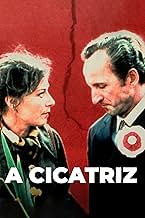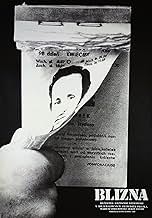CALIFICACIÓN DE IMDb
6.6/10
2.3 k
TU CALIFICACIÓN
Tras discusiones y negociaciones deshonestas, se decide el lugar de construcción de una nueva fábrica de químicos.Tras discusiones y negociaciones deshonestas, se decide el lugar de construcción de una nueva fábrica de químicos.Tras discusiones y negociaciones deshonestas, se decide el lugar de construcción de una nueva fábrica de químicos.
- Dirección
- Guionistas
- Elenco
- Premios
- 2 premios ganados y 1 nominación en total
Agnieszka Holland
- Hania
- (as A. Holland)
Malgorzata Lesniewska
- Malgosia
- (as M. Lesniewska)
Asja Lamtiugina
- Olecko Resident
- (as A. Lamtiugina)
Ryszard Bacciarelli
- Architect
- (as R. Bacciarelli)
Bohdan Ejmont
- Participant at the Chairman's Meeting
- (as B. Ejmont)
Henryk Hunko
- Olecko Resident
- (as H. Hunko)
Opiniones destacadas
Engineer Franciszek Pieczka is deputed to take over the construction of a factory in a small city in Poland. Although there are problems with the plans, he sets to work with a will. Soon, however, he finds opposition from the locals whose lives are disrupted, or can't get jobs on the project. As the project haltingly advances, the opposition grows, and he finds himself in conflict with the Party and the unions.
Krzysztof Kieslowski's first feature often has a documentary feel to it, but it's more of a character study. Pieczka is a technocrat, someone who knows how to get things done in terms of taking plans and allocating resources, but cannot factor in the personalities and conflicts of people into his equations. His relationship with his wife is a long-distance one; with his daughter, a criticized one. Although Kieslowski was later dissatisfied with the movie as an artifact of "social realism", and blamed the script, Pieczka's performance makes it very watchable.
Krzysztof Kieslowski's first feature often has a documentary feel to it, but it's more of a character study. Pieczka is a technocrat, someone who knows how to get things done in terms of taking plans and allocating resources, but cannot factor in the personalities and conflicts of people into his equations. His relationship with his wife is a long-distance one; with his daughter, a criticized one. Although Kieslowski was later dissatisfied with the movie as an artifact of "social realism", and blamed the script, Pieczka's performance makes it very watchable.
I cannot think of another film that so violates the founding principal of Cinema 101...show, do not tell...as consistently and completely as does this dull, bleak Polish offering from Kryztof Kieslowski. Just one long, uninvolving scene after another of Communist Party apartachik Stefan Bednarz wrestling with his conscience while being told of worker discontent at the nitrate factory he runs. At no point do we actually see the bad work place conditions that are causing the problems with which Bednarz, to mention nothing of the workers, who remain largely faceless, nameless and voiceless, is struggling. What we do see, repetitively and wearyingly, are shots of Bednarz grimacing, sighing, and looking bereft and forlorn as he smokes (did I mention this is a Polish film?) and drinks and gazes inward which may work in a novel or a play but is not gonna cut it on film. Oh, and the stuff with Bednarz and his daughter, where Kieslowski is trying to go mainstream, is like The Socialist Lifetime Channel. C plus.
Krzysztof Kieslowski became a highly appreciated art-house director in Europe when he made his TV-series about The Ten Commandments, "Dekalog" (1989). Later on, in the 1990's he directed The Double Life of Veronique and The Three Colours trilogy, which confirmed his position in the international art-house. As most filmmakers do so did he start by making documentaries, then he made two films for the Polish television and after that his first film for the big screen, Blizna (The Scar, 1976).
Kieslowski himself called the film horrible. He criticized its screenplay and categorized the film as socialist realism. He probably saw something I can never be able to see; something that only the one who made the film could see. Blizna is a realistic film about a socialist society, but socialist realism was never even close to realism. It's full of that blind optimism which Stalin so idealized. But Kieslowski's film, Blizna, is incredibly pessimistic: it shows how socialism works, how it doesn't work, how it cannot work and how it's impossible for anyone to make a change in a society like that. However, one shouldn't feel that Kieslowski was a man cheering for individualism, market economy or economic liberalism. He always called himself unpolitical and criticism for the new, capitalist Poland can be seen in his later film Three Colors: White (1993).
Blizna is a story about a corporation which decides to build a new factory in spite of ecology, or the people living in the area. They choose a man with a family to lead the project. Quickly he reveals to be a man who takes responsibility and tries to finish the project with honor. He soon starts to see the flaws of the project, where moral is only one defect. In his journey through Machiavellist politics he finds making a change incredibly difficult.
The authorities of Poland didn't ban Blizna, but they treated it badly, and basically no one saw it until the producer of The Three Colours trilogy brought a bunch of films from Kieslowski's early career to the screen. Having seen Blizna today, it might have partly lost its grip, since it is tightly tied to its own time. The 1970's can be seen in just about everything: in the style, in the narrative, in the dialog and in the costumes. This isn't a bad thing, by any means, but Blizna certainly isn't a timeless classic. But what it is, is a good description of it's time. It shows how Poland worked in the 1970's under the socialist government; how it did not worked. Kieslowski said in his interview book, Kieslowski on Kieslowski by Danusia Stok, how sad it is that no one takes responsibility on what happened during the era -- not even today.
Blizna is very pessimistic and has got inconsolable despair. It shows how impossible it was to make a change in Poland and how hopeless the era was. To put it briefly, it's a satirical description of the authorities of Poland. It is funny, political, pessimistic and very interesting for those who love Kieslowski, European art-house or are interested in history of the 20th century.
Kieslowski himself called the film horrible. He criticized its screenplay and categorized the film as socialist realism. He probably saw something I can never be able to see; something that only the one who made the film could see. Blizna is a realistic film about a socialist society, but socialist realism was never even close to realism. It's full of that blind optimism which Stalin so idealized. But Kieslowski's film, Blizna, is incredibly pessimistic: it shows how socialism works, how it doesn't work, how it cannot work and how it's impossible for anyone to make a change in a society like that. However, one shouldn't feel that Kieslowski was a man cheering for individualism, market economy or economic liberalism. He always called himself unpolitical and criticism for the new, capitalist Poland can be seen in his later film Three Colors: White (1993).
Blizna is a story about a corporation which decides to build a new factory in spite of ecology, or the people living in the area. They choose a man with a family to lead the project. Quickly he reveals to be a man who takes responsibility and tries to finish the project with honor. He soon starts to see the flaws of the project, where moral is only one defect. In his journey through Machiavellist politics he finds making a change incredibly difficult.
The authorities of Poland didn't ban Blizna, but they treated it badly, and basically no one saw it until the producer of The Three Colours trilogy brought a bunch of films from Kieslowski's early career to the screen. Having seen Blizna today, it might have partly lost its grip, since it is tightly tied to its own time. The 1970's can be seen in just about everything: in the style, in the narrative, in the dialog and in the costumes. This isn't a bad thing, by any means, but Blizna certainly isn't a timeless classic. But what it is, is a good description of it's time. It shows how Poland worked in the 1970's under the socialist government; how it did not worked. Kieslowski said in his interview book, Kieslowski on Kieslowski by Danusia Stok, how sad it is that no one takes responsibility on what happened during the era -- not even today.
Blizna is very pessimistic and has got inconsolable despair. It shows how impossible it was to make a change in Poland and how hopeless the era was. To put it briefly, it's a satirical description of the authorities of Poland. It is funny, political, pessimistic and very interesting for those who love Kieslowski, European art-house or are interested in history of the 20th century.
Nominally, this is a movie about a quaint town in Poland where the local communist party hack lobbies to bring a chemical factory to town.
He uses dubious photos of impoverished locals to convince his fellow local party flunkies that the town desperately needs jobs. Then he brings in the regional party hacks for lobbying, and has a bunch of locals stand outside the offices to show their support for the factory (it's implied they were actually told it was a demonstration AGAINST the factory).
And on it goes like this, with our main character being appointed from out of town, against his wife's wishes, to head up the project.
The project bulldozes a forest. The party flunkies condescend to the locals, with their social and ecological concerns. Our main character expresses his misgivings. But at no time does the project - a nitrate factory - ever slow down. It's all in service of The Party, you see.
The amazing this is, however, is that the theme of this movie transcends its time and place.
Think about Your Town, where the local billionaire sports team owner paid off the local town council so he could bulldoze a few downtown city blocks, get a new arena/stadium built at taxpayers' expense, and then spread the manure of ''revitalization" to sell the concept to the locals.
Billionaire gets richer. Councillors put their kids through college. Contractors get rich. Tradesmen get jobs for a couple of years. Poor people stay poor. And the town is left to clean up the social and ecological long-term damage.
Today, towns and states rush to built light rail transit projects. Rinse and repeat.
There's no ranting and raving or pounding of fists. No car chases or gun play. Just a man trying to navigate his way through a system. The genius is that this system persists everywhere, across all ideologies.
The director himself might have thought he'd made a bad film. Maybe in the immediate aftermath, with ambitions to do more polished work, he was justified in his self-criticism. But with the perspective of 50 years I'd say he turned out a timeless masterpiece. It makes anything cranked out by serial polemicist Michael Moore look like cheap home-made fluff by comparison.
He uses dubious photos of impoverished locals to convince his fellow local party flunkies that the town desperately needs jobs. Then he brings in the regional party hacks for lobbying, and has a bunch of locals stand outside the offices to show their support for the factory (it's implied they were actually told it was a demonstration AGAINST the factory).
And on it goes like this, with our main character being appointed from out of town, against his wife's wishes, to head up the project.
The project bulldozes a forest. The party flunkies condescend to the locals, with their social and ecological concerns. Our main character expresses his misgivings. But at no time does the project - a nitrate factory - ever slow down. It's all in service of The Party, you see.
The amazing this is, however, is that the theme of this movie transcends its time and place.
Think about Your Town, where the local billionaire sports team owner paid off the local town council so he could bulldoze a few downtown city blocks, get a new arena/stadium built at taxpayers' expense, and then spread the manure of ''revitalization" to sell the concept to the locals.
Billionaire gets richer. Councillors put their kids through college. Contractors get rich. Tradesmen get jobs for a couple of years. Poor people stay poor. And the town is left to clean up the social and ecological long-term damage.
Today, towns and states rush to built light rail transit projects. Rinse and repeat.
There's no ranting and raving or pounding of fists. No car chases or gun play. Just a man trying to navigate his way through a system. The genius is that this system persists everywhere, across all ideologies.
The director himself might have thought he'd made a bad film. Maybe in the immediate aftermath, with ambitions to do more polished work, he was justified in his self-criticism. But with the perspective of 50 years I'd say he turned out a timeless masterpiece. It makes anything cranked out by serial polemicist Michael Moore look like cheap home-made fluff by comparison.
Scar is a brave film which takes its time to settle nicely in viewers' minds.It starts in a highly official manner and later develops into a family tragedy.In Scar the best thing to watch is the manner in which all the elements of human weaknesses are portrayed.Helpless characters not being able to come out of their shell is an accepted trait of Kieslowski's films and it is very much evident in The Scar too as its leading player Bednarz is trapped from all sides.He can neither free himself from family pressures coming from his wife and daughter nor from his job under a communist regime.It would be wrong to judge this film's characters based on their actions but it would nevertheless not be wrong to claim that they are victims of unfortunate circumstances as they are being trapped under a system in which change is slow to come and consensus is really reached.For all those interested in Polish cinema they are some very good glimpses of 2 of the most outstanding figures of Polish cinema : a young Agnieszka Holland as an actress and Jerzy Stuhr as a young communist party worker.
¿Sabías que…?
- TriviaFirst ever theatrical film directed by Krzysztof Kieslowski.
- Citas
Stefan Bednarz: That's no way to live. You have to figure out what you want.
Stefan's Daughter: Is your life the way to live? A new job and home and friends every five years? I don't know. You've left Mom on her own. Is that a way to live?
- ConexionesEdited into Klaps (1976)
Selecciones populares
Inicia sesión para calificar y agrega a la lista de videos para obtener recomendaciones personalizadas
- How long is The Scar?Con tecnología de Alexa
Detalles
Contribuir a esta página
Sugiere una edición o agrega el contenido que falta

Principales brechas de datos
By what name was La cicatriz (1976) officially released in India in English?
Responda
































